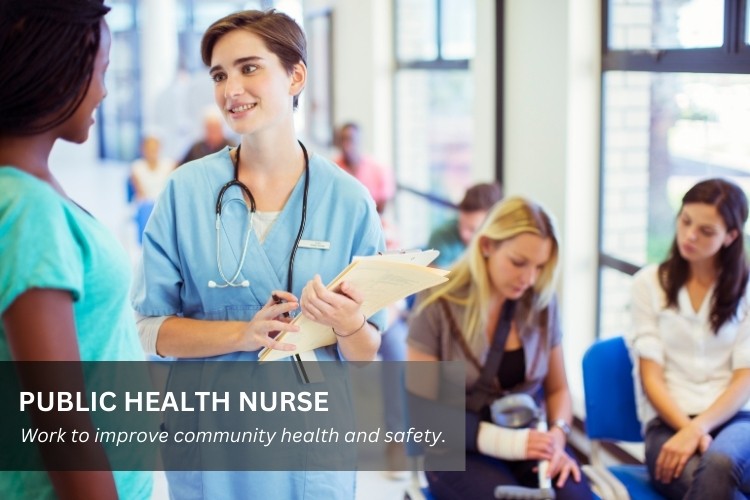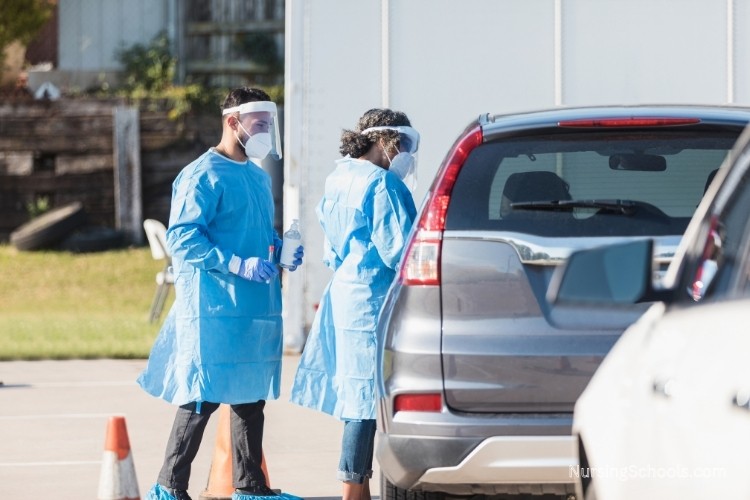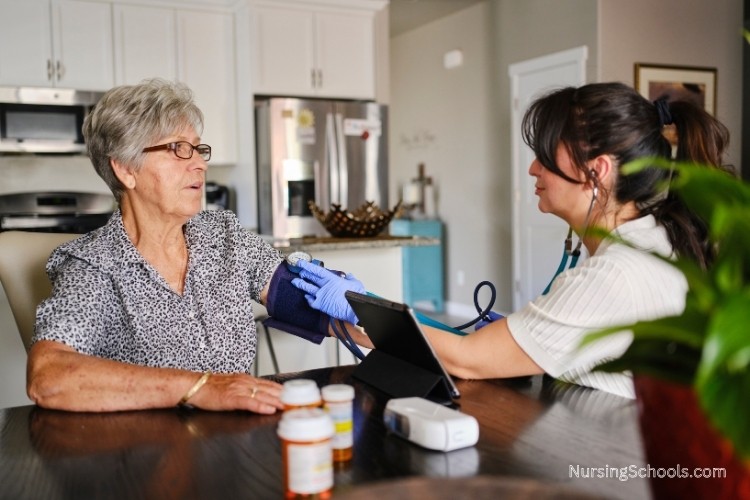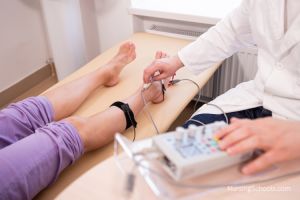Public Health Nurse (PHN)
Nursing Career Guide

Overview
What Is a Public Health Nurse?
A Public Health Nurse, commonly referred to as a PHN, is a Registered Nurse (RN) who focuses on promoting community health, preventing disease, and improving access to care for populations rather than individuals. PHN assess health trends, develop educational programs, and advocate for policies that address social determinants of health.
Public Health Nurses work in government agencies, schools, nonprofit organizations, community clinics, and home health settings. They often serve vulnerable populations such as low-income families, children, the elderly, and rural residents, strongly emphasizing preventive care and health equity.
This role is ideal for nurses who want to make a broad impact on community well-being and address systemic healthcare challenges through education, outreach, and policy engagement.
Education
How To Become a Public Health Nurse
Becoming a Public Health Nurse requires a combination of traditional nursing education, clinical experience, certification, and a strong interest in population-based health. Follow these steps to enter this challenging and rewarding healthcare career:
- Earn a Nursing Degree. Complete an Associate Degree in Nursing (ADN) or a Bachelor Degree in Nursing (BSN). Many public health departments prefer or require a BSN.
- Pass the NCLEX-RN. Obtain licensure as a Registered Nurse by passing the National Council Licensure Examination.
- Gain Community Experience. Work in community health, school nursing, or outpatient clinics to build experience in education, outreach, and case management.
- Apply for Public Health Certification (Optional). Some states issue a PHN designation separately or require continuing education in public health nursing.
- Pursue Graduate Study (Optional). A Master of Public Health (MPH) or a Master of Science in Nursing (MSN) with a public health focus can open doors to advanced roles in epidemiology, program management, or policy.
How long does it take to become a Public Health Nurse? It typically takes 4 to 6 years to become a Public Health Nurse, including education and clinical experience. Optional certifications or graduate education may be required for specialized or leadership roles within the public health system.

Average Salary
How Much Does a Public Health Nurse Make?
Salaries for Public Health Nurses vary based on location, employer, and responsibilities. On average, a Public Health Nurse can expect to earn between $70,000 and $100,000 annually.
Average annual salary for a Public Health Nurse:
- Entry-level: $70,000 - $80,000 per year.
- Mid-career: $80,000 - $90,000 per year.
- Experienced: $90,000 - $100,000+ per year.
The U.S. Department of Labor classifies Public Health Nurses under Registered Nurses, with an average annual salary of $87,360. PHN working for government agencies or large nonprofit organizations may also receive benefits such as loan repayment, pension plans, and flexible schedules.
Career advancement for Public Health Nurses may include roles such as Community Health Program Manager, Epidemiology Nurse, or Director of Public Health Nursing within local or state health departments. Others may transition into public policy, global health initiatives, or academic roles focused on training the next generation of community health nurses.
Job Duties
What Does a Public Health Nurse Do?
Public Health Nurses focus on the health of communities by assessing public needs, designing interventions, and evaluating outcomes. Their work often targets disease prevention, health promotion, and reducing disparities across populations. The most common job duties of a Public Health Nurse include:
- Assessing Community Health. Collect and analyze data to identify health risks, disparities, and service gaps in specific populations.
- Health Education. Develop and deliver educational programs on nutrition, disease prevention, maternal health, vaccinations, and more.
- Disease Surveillance. Monitor outbreaks and report cases of communicable diseases to local and state health departments.
- Case Management. Coordinate services for individuals with chronic illnesses, limited access to care, or complex socioeconomic needs.
- Advocacy and Policy Support. Promote public health initiatives, participate in legislative advocacy, and support changes that improve population health.
- Emergency Response. Assist in disaster preparedness and response, including vaccination drives, shelter care, and emergency communications.
- Home Visits. Conduct in-home assessments for new mothers, the elderly, or those with limited mobility to ensure continuity of care.
- Advanced Duties. Experienced PHN may manage public health programs, supervise staff, or lead grant-funded initiatives aimed at health equity and community development.
Public Health Nurses serve as frontline advocates for healthier communities. Their work improves outcomes not only for individuals but for entire populations across cities, counties, and regions.

Essential Skills
What Skills Does a Public Health Nurse Need?
Public Health Nurses need strong communication, cultural awareness, and organizational skills. They must understand public health principles while maintaining the clinical expertise to assess and support individual clients when necessary. Here are some of the skills a Public Health Nurse needs to succeed:
- Community Assessment. Evaluate the health needs of populations using data, surveys, and public health tools.
- Health Promotion. Design and lead effective programs that encourage healthier behaviors and disease prevention.
- Cultural Competence. Serve diverse communities with sensitivity to language, beliefs, and access barriers.
- Education and Counseling. Communicate complex health topics in simple, clear language suitable for various audiences.
- Collaboration. Partner with schools, local agencies, nonprofits, and policymakers to build networks of support and care.
- Data Interpretation. Analyze epidemiological and community-level data to guide program development and response planning.
- Advocacy. Champion social and environmental policies that address root causes of illness such as poverty, housing, and food insecurity.
- Adaptability. Work in changing environments, from clinic outreach to disaster relief efforts or school-based screenings.
One of the biggest challenges of being a Public Health Nurse is addressing healthcare disparities with limited resources and time. Nurses often manage large caseloads across underserved communities, balancing tasks like immunization drives, home visits, and health screenings with grant deadlines and staffing shortages. Despite these constraints, Public Health Nurses make a powerful impact by improving access to care and promoting wellness at the population level.
Work Environment
Where Does a Public Health Nurse Work?
Public Health Nurses work in community-based settings where the focus is on population health, disease prevention, and health promotion. They often serve vulnerable populations and collaborate with government agencies, nonprofits, and healthcare organizations to improve public health outcomes. The most common workplaces for a Public Health Nurse include:
- Local and State Health Departments. Lead vaccination efforts, track disease outbreaks, and implement community wellness programs.
- Community Clinics. Provide direct care, screenings, education, and referrals for underserved or at-risk populations.
- Schools and Educational Programs. Support student health, conduct health education sessions, and manage communicable disease prevention efforts.
- Home Health and Outreach Services. Visit patients in their homes to assess needs, administer care, and connect families with support resources.
- Nonprofit and Advocacy Organizations. Work on public health campaigns, policy initiatives, and grant-funded health improvement projects.
- Correctional Health Programs. Address the unique public health needs of incarcerated individuals through education and care coordination.
Public Health Nurses typically work during regular business hours but may respond to emergencies such as disease outbreaks or natural disasters. Their work environment is varied, blending office-based planning with community outreach and direct interaction with individuals, families, and groups.
Last updated: May 22, 2025
References:
- Registered Nurses. Bureau of Labor Statistics, U.S. Department of Labor. Occupational Outlook Handbook. Retrieved May 22, 2025.
- NCLEX Nurse Licensure Exam. National Council of State Boards of Nursing (NCSBN). Retrieved May 22, 2025.
- Registered Nurse (RN) Salary in the United States. ZipRecruiter, Healthcare Career Path. Retrieved May 22, 2025.
- How To Become a Registered Nurse. Indeed, Healthcare Career Guide. Retrieved May 22, 2025.
- Public Health Nurse. Johnson & Johnson, Nursing Careers. Retrieved May 22, 2025.
- Association of Public Health Nurses (APHN). Professional organization for all practicing public health nurses (PHN). Retrieved May 22, 2025.
- Public Health Nurse: Role, Responsibilities and Career Path. University of St. Augustine for Health Sciences. Retrieved May 22, 2025.
- Master of Public Health (MPH) Degree. Yale School of Public Health. Retrieved May 22, 2025.
- Master of Public Health. Idaho State University, Department of Community and Public Health. Retrieved May 22, 2025.


